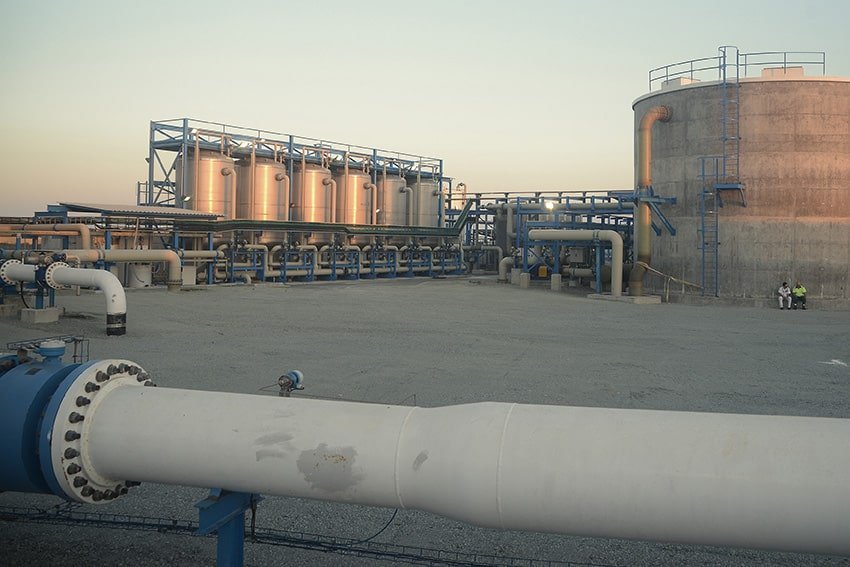Coastal engineer Xenia Loizidou on Friday slammed the government’s plan to import mobile desalination plants from the United Arab Emirates to solve Cyprus’ water shortage as an “incoherent panic solution”.
Speaking to the Cyprus News Agency, she said the units are “of course a solution”, but said that “to really solve the water problem, the first thing which needs to be done is to invest in infrastructure and proper management of uses”.
This, she said, must entail there being “no lawns and golf courses” and an “adaptation” of crops to plant those which are less water intensive.
“The desalination units which will come … will altogether produce only 5.5 million cubic metres of water, and at a cost. I wonder why the 10 million cubic metres of treated water available from the wastewater treatment plant in Mia Milia is not an option, and why, for political or other reasons, what the bicommunal technical committee on the environment has been calling for years is not progressing,” she said.
She went on to pose other questions regarding the desalination plants, asking how much they would cost to install, and whether the brine produced as a byproduct of desalination will end up in shallow waters.
If it does, she said, “we will see enormous impacts on biodiversity and on the quality of coastal waters”.
Additionally, she said, the coming desalination plants are powered by fossil fuels and have been sent to Cyprus “because the UAE is renewing its own units and installing new ones powered by renewable energy sources”.
This, she said, will “increase the pollution fees billpayers pay on our own electricity bills”.
“There is also a real cost for billpayers from the desalination units because they are not part of an overall plan but a spasmodic move,” she added.
On the matter of water security itself, she said the water development department had as early as 2008 prepared a study on Cyprus’ infrastructure, with the aim of preventing the island from being “dependent on weather conditions” for its water supply.
However, she said, “since then, much has been announced, little has been done”.
“If with two accidents, Mavrokolympos and Kouklia, the entire state planning collapses, then we are clearly a country which is defenceless and this water policy has failed over time,” she said, referring to the draining of the Mavrokolympos reservoir and a fire at a desalination plant near the Paphos district village of Kouklia.
Loizidou’s comments come after President Nikos Christodoulides had announced on Wednesday night that desalination units would be brought to Cyprus from the UAE to ensure the island’s water supply.
Later, government spokesman Konstantinos Letymbiotis said there will be “no risk” of there being any water cuts in Cyprus this summer as a result of the units’ forthcoming arrival.
“Units with a capacity of 15,000 cubic metres per day, corresponding to our needs, will arrive in time, so that the Republic of Cyprus is not at risk of water cuts,” he said, adding that the units will arrive in Cyprus “in a timely manner”.
Christodoulides had stressed that the units will be provided “free of charge”, a fact he said “underlines the importance of relations in the context of the country’s foreign policy, and in matters of internal policy”.
He said he had submitted a request to the UAE, and that the country’s President Mohamed bin Zayed Al Nahyan had personally decided that it be provided free of charge, “within the context of the excellent political relations we have”.
Additionally, he said, the unit will be provided “immediately, to cover the country’s water needs for 2025”.
Agriculture Minister Maria Panayiotou had said that each unit would be capable of producing around 15,000 cubic metres of water per day – the same amount produced by the desalination plant which burnt down in Kouklia.
“Essentially, this is our planning, so that by the end of August, when the unit in Paphos will be operational, neither the Paphos nor the Limassol districts will be left without water. With this development, we are significantly reducing the risk of cuts,” she said.
Asked where the units may be installed, she said there are “various locations” which are possible, and that the water development department is currently conducting on-site inspections.
“Today, already, there are operators in the field. We will announce the final locations in the near future, because we are waiting for details. However, Limassol and Paphos have the greatest need, and priority is being given to them,” she said.
She also appealed to the public to use water sparingly, saying that “the desalination units will cover our drinking water needs, that humans need, and not the footpaths”.






Click here to change your cookie preferences